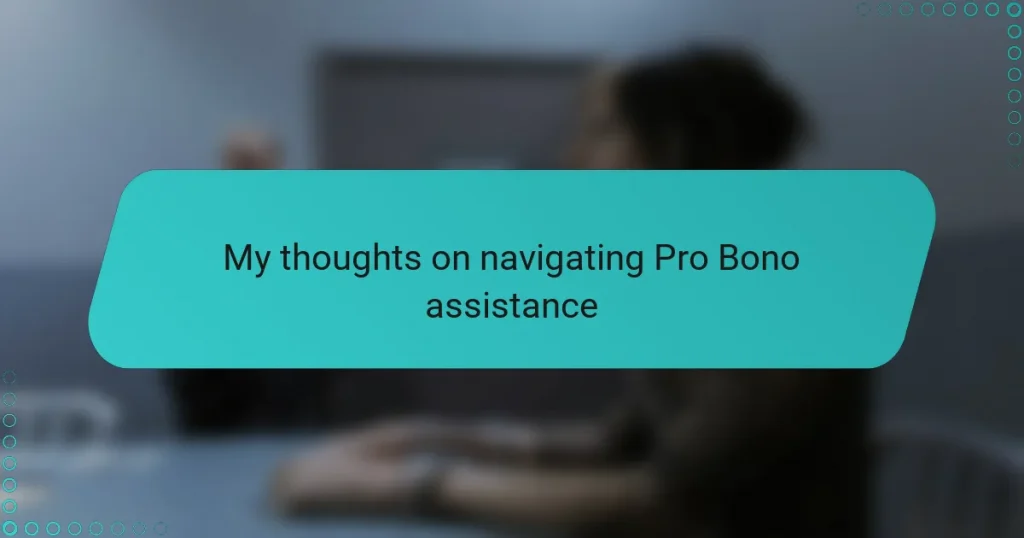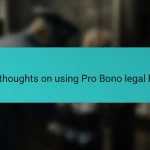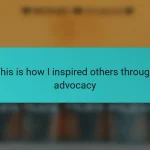Key takeaways
- Pro bono legal assistance is a vital resource that empowers individuals by providing access to essential legal advice and support, restoring their dignity and confidence.
- Finding pro bono lawyers can be achieved through local bar associations, community legal aid organizations, and law school clinics, with clear communication of needs being key.
- Important qualities to seek in pro bono lawyers include empathy, clear communication, and reliability to foster trust and effective legal relationships.
- Preparation for consultations, including organizing documentation and setting clear goals, significantly enhances the effectiveness of pro bono legal support.
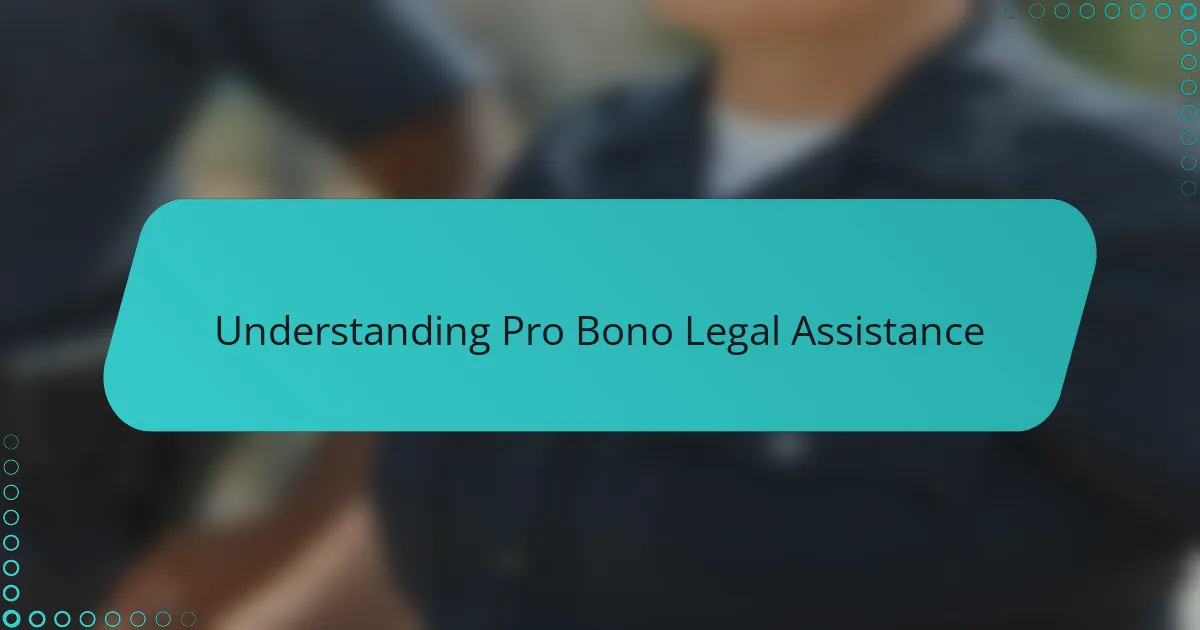
Understanding Pro Bono Legal Assistance
Pro bono legal assistance often feels like a lifeline for those who cannot afford traditional legal services. From my experience, it’s more than just free help—it’s a commitment by attorneys to serve justice where it might otherwise be out of reach. Have you ever wondered how powerful access to even a few hours of expert legal advice can be for someone facing a daunting legal challenge?
When I first got involved with pro bono work, I quickly realized it’s not just about offering time but about building trust and hope. Many clients I met were overwhelmed and uncertain about their rights, and even a small gesture of guidance gave them a sense of empowerment. It’s amazing how much impact these acts of service have on both the client and the attorney involved.
Understanding pro bono assistance also means recognizing the ethical dedication behind it. Lawyers volunteer their expertise without expecting payment, driven by a desire to balance the scales of justice. This dedication raises a question: how can the legal community—and we as individuals—better support and expand access to these vital services?
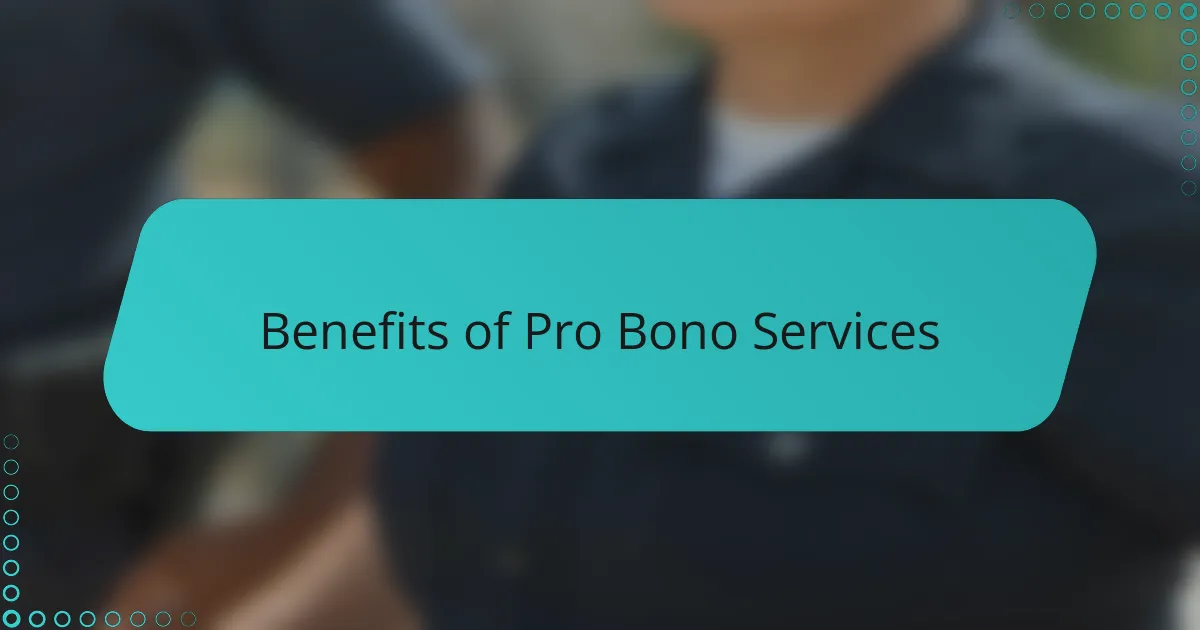
Benefits of Pro Bono Services
One of the most striking benefits of pro bono services, from my perspective, is how they restore dignity to those facing legal struggles. I remember working with a single mother who felt invisible in the legal system—after just a few consultations, she not only understood her rights but felt like a participant in her own story again. Isn’t it incredible how access to legal support can transform someone’s entire outlook?
Another aspect I appreciate deeply is the way pro bono work bridges gaps in justice that otherwise remain wide open. It’s not just about providing free advice; it’s about creating a safety net for people who might otherwise fall through. When I see clients walk away relieved and hopeful, I realize these services do more than solve cases—they rebuild lives.
Lastly, I find that pro bono legal assistance enriches the lawyers themselves in unexpected ways. Engaging in this work reminds me why I became a lawyer in the first place—to make a tangible difference. Have you ever noticed how helping others can renew your own sense of purpose? That’s a benefit no paycheck can buy.
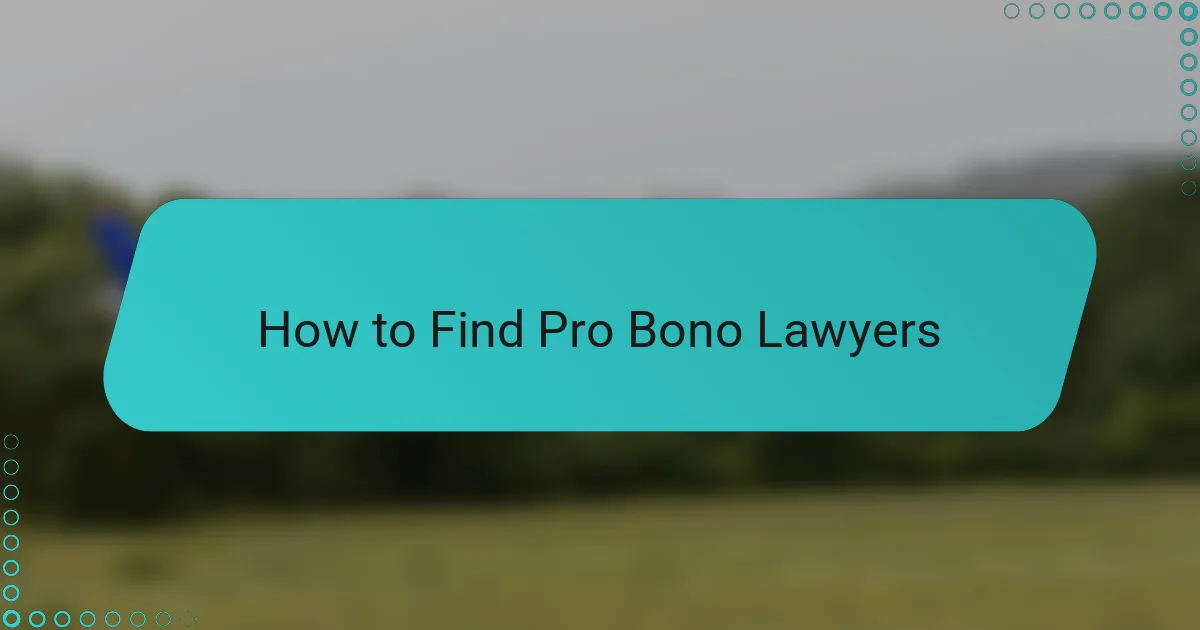
How to Find Pro Bono Lawyers
When I first needed to find a pro bono lawyer, I started by reaching out to local bar associations—they often have dedicated programs matching clients with volunteers. Have you tried tapping into community legal aid organizations? From what I’ve seen, these groups are incredible resources because they’re connected to lawyers who genuinely want to help.
Another approach that worked for me was asking around in networks—sometimes word of mouth brings you to lawyers who don’t advertise their pro bono work but are eager to take on meaningful cases. I found that being clear about my situation and needs opened doors; honesty seems to inspire lawyers to step in when they can.
I also discovered that many law schools run clinics where supervised students provide assistance under attorney guidance. It might sound unconventional, but these clinics offer thorough help and fresh perspectives. Have you considered this option? In my experience, it’s a great way to get quality support while also contributing to the education of future lawyers.
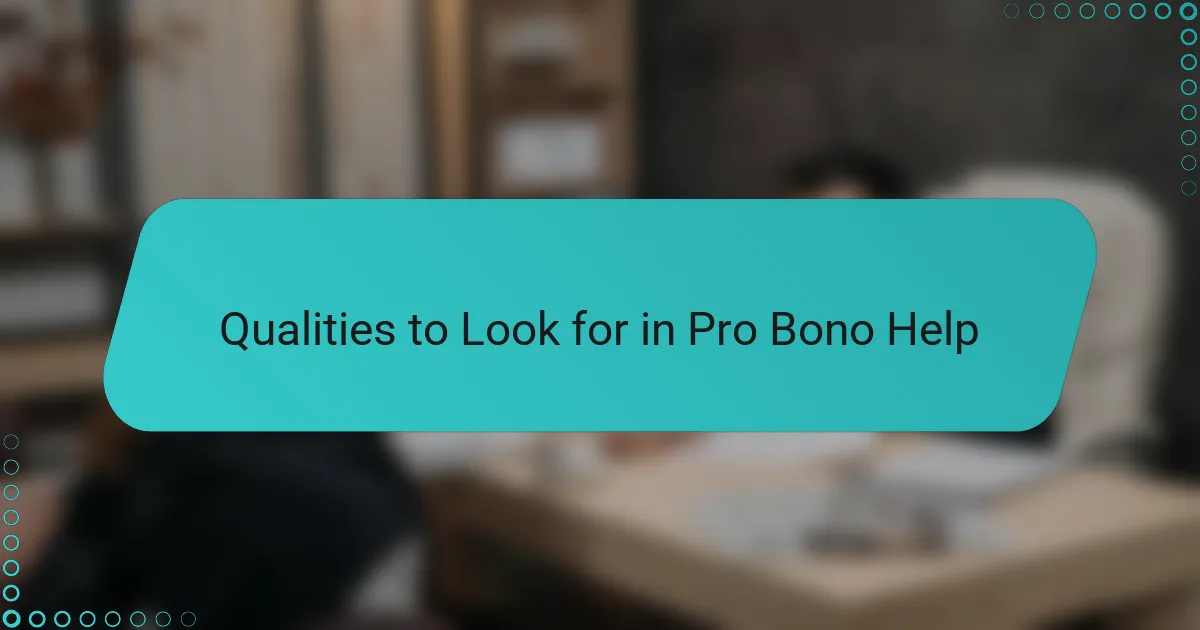
Qualities to Look for in Pro Bono Help
When looking for pro bono help, I’ve found that empathy stands out as the most important quality. A lawyer who truly listens and understands your situation can make all the difference, especially when you’re feeling vulnerable or overwhelmed. Have you ever noticed how comforting it is just to be heard?
Another quality I value is clear communication. In my experience, lawyers who explain the legal process in plain language—not legal jargon—help clients feel more confident and less intimidated. It’s one thing to get advice; it’s another to actually grasp what it means for your case.
Reliability is equally crucial. I’ve seen cases where pro bono attorneys exceeded expectations by being responsive and consistent, which built trust quickly. When your legal advocate shows up when promised, it changes the whole dynamic and makes the journey less daunting. Don’t you think trust is the foundation of any effective legal relationship?
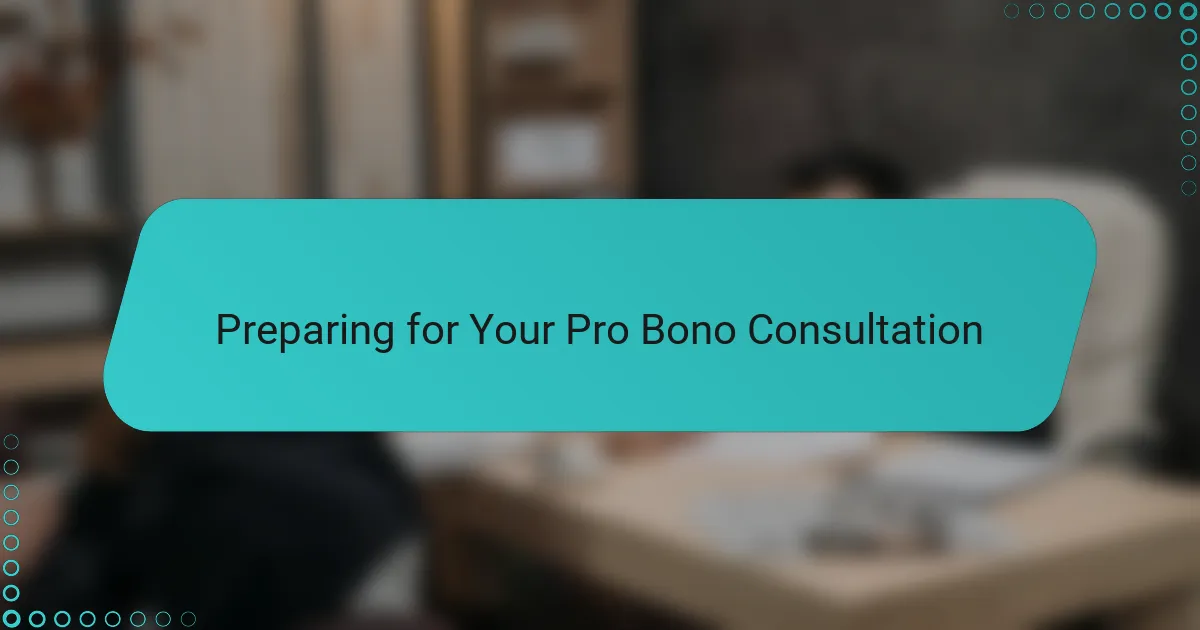
Preparing for Your Pro Bono Consultation
Preparing for your pro bono consultation starts with gathering all relevant documents—anything from letters, contracts, to court papers. I remember a client who showed up with scattered papers and felt overwhelmed; once we organized everything, the consultation felt more focused and productive. Have you ever noticed how having your paperwork ready can change the whole tone of a meeting?
It’s also helpful to write down your questions beforehand. When I prepare like this, I find the session flows better and I don’t forget important points in the moment. Don’t you think being organized helps you feel more in control, especially when dealing with something as intimidating as legal issues?
Finally, setting clear goals for your consultation can make a big difference. I’ve seen clients who came unsure of what they wanted, and by the end of our talk, they had a solid plan of action. What do you hope to achieve from your first meeting? Keeping that in mind can guide the conversation and maximize the help you receive.
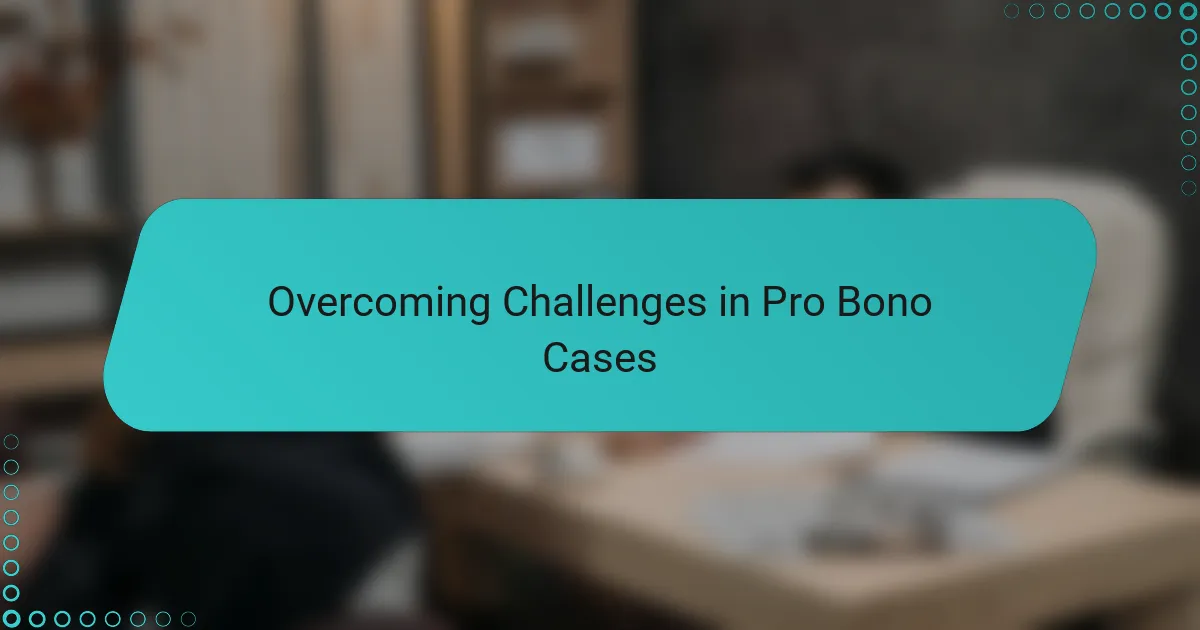
Overcoming Challenges in Pro Bono Cases
Navigating the challenges in pro bono cases often means juggling limited time and resources, which can be frustrating. From my experience, staying flexible and patient is key—sometimes the best outcome isn’t a swift legal victory but a step forward in understanding or hope. Have you ever felt that focusing on small wins helps maintain momentum when the bigger picture seems overwhelming?
Another hurdle I’ve noticed is managing clients’ high expectations, especially when they’re dealing with complex legal issues. I found that setting clear, honest boundaries early on prevents misunderstandings and builds trust. Isn’t it easier to work together when everyone knows what’s realistically possible?
Lastly, the emotional weight in pro bono cases can be heavy for both client and lawyer. I’ve learned that acknowledging these feelings openly—not pushing them aside—creates space for empathy and connection. How often do we, as advocates, remind ourselves that patience and compassion are powerful tools alongside legal knowledge?
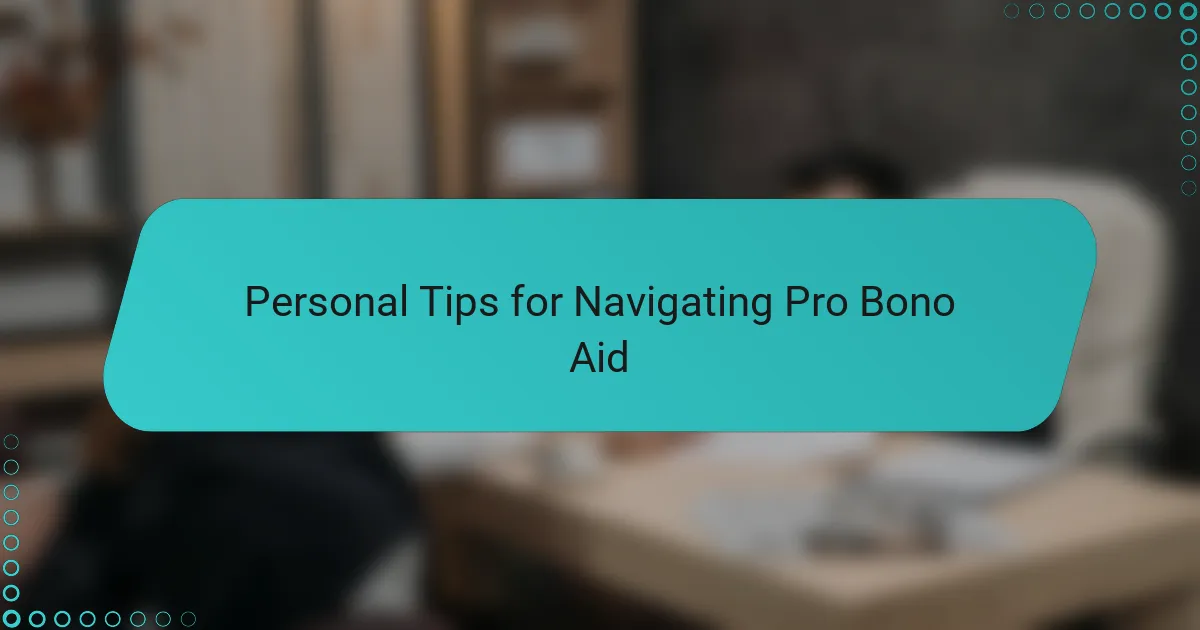
Personal Tips for Navigating Pro Bono Aid
One thing I’ve learned is the importance of being upfront about your situation when seeking pro bono aid. When I first reached out, being honest about my circumstances helped me connect with attorneys who genuinely wanted to help, rather than feel obligated. Have you ever noticed how transparency can open doors in unexpected ways?
Another tip that’s worked well involves staying organized. Before meetings, I always gather all relevant documents and jot down questions. It’s amazing how much smoother the conversation goes when you’re prepared, and it shows respect for the lawyer’s time. Don’t you think that small effort can make a huge difference in the outcome?
Finally, I believe patience is crucial throughout the process. Pro bono lawyers often balance many cases, so understanding the limits and setting realistic goals early on really eases the journey. Have you found that focusing on progress, no matter how small, helps maintain hope during tough legal battles?
